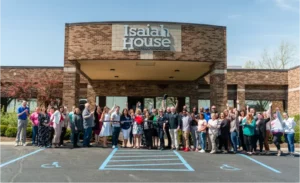If you ask two people how they ended up in active addiction, you are likely to receive two different answers.
What causes addiction? The truth is, there is no one-size-fits-all answer. Genetics, home life, peer pressure, traumatic experiences and mental health conditions can all influence the development of an addiction. Oftentimes it is a combination of factors that lead to a person developing an addiction and needing addiction treatment.
Addiction can affect anyone
A person of any race, gender, socio-economic background or family dynamic can develop an addiction to drugs or alcohol. One person may have grown up in a broken home in a poor neighborhood while another may come from a middle-class family and with supportive and present parents. Both could find themselves grappling with substance use disorder and in need of addiction recovery services.
While environmental factors and family influence certainly contribute to the development of addictive behaviors, causes of addiction are unique to an individual and may not be easily recognized by others.
Genetics play a role
Addiction is a complex disease and, as with many diseases, biology and a person’s genetics influence their risk for developing substance use disorder.
Just as traits can be passed from parent to child to influence physical appearance, behaviors and predisposition to medical conditions such as certain cancers, the risk of addiction is also something that can be inherited.
According to the American Addiction Centers, addiction is considered “moderately to highly heritable” and genetics play a significant role in addiction. A person who has relatives with addiction is at an increased risk of developing an addiction themselves.
Not every person with a family history of addiction will develop their own addiction, however. Siblings from the same household or even identical twins could drink alcohol but only one develop an alcohol use disorder.
This falls back to the understanding that multiple factors influence the risk and development of addiction.
Navigating trauma and mental health
Oftentimes, drugs and alcohol are used as a coping mechanism or a way for someone to navigate past trauma or negative feelings. A person may use drugs or alcohol to numb emotional pain and they become dependent on maintaining that altered state.
Adverse childhood experiences, as well as adverse experiences in adulthood, can lead to physical and emotional difficulties that may contribute to someone seeking ways to cope. Such experiences could include physical, sexual or verbal abuse, domestic violence, loss of family structure, the death of a loved one or having a family member affected by mental illness, addiction or incarceration, among other experiences.
Traumatic experiences can lead to the development of post-traumatic stress disorder, the symptoms of which can be exacerbated by the use of drugs or alcohol to cope with that trauma.
Mental health disorders such as anxiety, depression and mood disorders can also be influenced by various factors such as trauma, genetics and environment, and addiction can often coexist with these conditions.
According to the National Institute on Drug Abuse, people who suffer from mental health disorders such as anxiety or bipolar disorder are twice as likely to also have substance use disorder, and each condition can affect the other.
Environment influences use
A person’s environment also impacts their risk of developing an addiction. While addiction can affect someone from any background, factors such as poverty, lack of parental supervision or involvement, and prevalence of drugs at home or school could increase opportunities to “experiment,” turn to drugs or alcohol to cope with emotional difficulties or not receive proper intervention before an addiction develops.
Parents who are in addiction or involved in criminal activity are likely to model negative behaviors for their children or create an environment that increases stress or potential for adverse experiences as mentioned above.
According to the National Institute on Drug Abuse, people who suffer from mental health disorders such as anxiety or bipolar disorder are twice as likely to also have substance use disorder, and each condition can affect the other.
Prescription misuse is a growing problem
While many testimonies of addiction involve recreational drug use as teens or using drugs and alcohol to cope with traumatic experiences and mental health conditions, some addictions begin with the misuse of prescription medications and a lack of proper medication management.
It is no secret the overprescribing of medications, particularly opiates, has fueled the epidemic of addiction worldwide.
Prescription drugs are the third most misused substance after marijuana and cocaine, according to the National Center for Drug Abuse Statistics. While the overall misuse of prescription medications has declined since 2015, it is still a critical problem, particularly among adolescents.
In some cases, a person is prescribed pain medication following a procedure such as surgery and there is a lack of follow-up from the prescribing physician to help a person taper off that medication as they heal. In other cases, prescription medications are used without the direction of a doctor, such as someone using a prescription substance that is not prescribed to them.
Fewer than 1-in-10 people misuse prescriptions with the goal of getting high, but about 12% become addicted to the prescription substance they misuse. The misuse of and addiction to prescription medications can also lead to a person building a tolerance to that medication and seeking an alternative substance. This is a common occurrence in the use of prescription opiates leading to eventual use of heroin, fentanyl or other illicit drugs.
A misconception of the dangers and addictiveness of prescription medications contribute to misuse and subsequent dependency. Careful medication management, education and safe medication disposal initiatives are important to combating prescription misuse and addiction.
Early intervention, prevention is crucial
Recognizing the risk factors of addiction can help to address a problem before it grows. Many people who are in active addiction or recovery report they started using drugs or alcohol at a young age.
NIDA and the Substance Abuse and Mental Health Services Administration recommend the use of prevention programs targeting families, schools and communities, education of children, teens and parents on the dangers of addiction and risks of substance use, and access to parental and family supports as efforts to prevent addiction from occurring.
For children and teens, NIDA also stresses the importance of protective strategies such as teaching impulse control, parental monitoring, promotion of academic achievement and involvement in extracurricular activities, anti-drug use policies and enforcement, and developing meaningful connections within the community.
Break the stigma
An important tool in addressing addiction among families and in communities is to break the stigma that is associated with drug and alcohol use.
Too often, addiction is painted as a moral flaw rather than a legitimate disease that affects the brain. As we have learned, addiction can affect anyone. It can affect your loved one, your neighbor, and yourself, and it may not always be recognized at a first glance.
The blame and shame that is placed on those in addiction prevent many people from speaking up about their addiction and ultimately costs lives each year.
Creating a supportive environment that encourages others to seek help, acknowledging the need for treatment and addiction recovery services, and accepting addiction as a disease are the first steps to breaking down barriers for those in need of addiction treatment.
There is no one-size-fits-all cause of addiction. But understanding the different contributing factors will help you better identify effective treatment, provide early intervention, stop the cycle of addiction in families and be proactive in addressing addiction in your community.
Get help today
Isaiah House Treatment Center is a faith-based nonprofit recovery resource in Kentucky. We can help you or your loved one navigate recovery in a safe and judgment-free environment. Isaiah House Treatment Center offers short-term and long-term Residential, Intensive Outpatient and Outpatient addiction treatment for men and women.
Isaiah House Treatment Center is focused on offering holistic treatment for substance use disorder. This includes not only addressing the underlying causes of addiction but helping a person recover and equipping them with the tools and skills to succeed in recovery long-term.
If you think Isaiah House is right for you or your loved one, call the admissions department today at (859) 375-9200.




